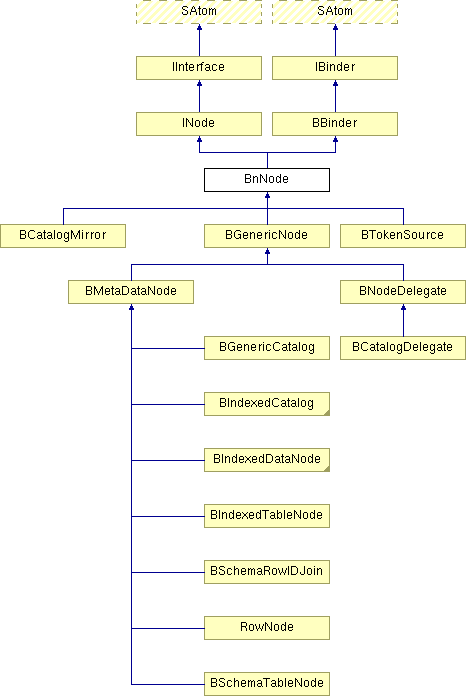
#include <support/INode.h>
Inheritance diagram for BnNode:

Public Member Functions | |
| virtual SValue | Inspect (const sptr< IBinder > &caller, const SValue &which, uint32_t flags=0) |
| Probe binder for interface information. | |
| virtual sptr< IInterface > | InterfaceFor (const SValue &descriptor, uint32_t flags=0) |
| Retrieve direct interface for this binder. | |
| void | PushAttributes (const sptr< INode > &value) |
| void | PushCreationDate (nsecs_t value) |
| void | PushEntryCreated (const sptr< INode > &who, const SString &name, const sptr< IBinder > &entry) |
| This event is sent when a new entry appears in the node. | |
| void | PushEntryModified (const sptr< INode > &who, const SString &name, const sptr< IBinder > &entry) |
| This event is sent when an entry in a catalog is modified. | |
| void | PushEntryRemoved (const sptr< INode > &who, const SString &name) |
| This event is sent when an existing entry is removed from the node. | |
| void | PushEntryRenamed (const sptr< INode > &who, const SString &old_name, const SString &new_name, const sptr< IBinder > &entry) |
| This event is sent when an entry in the catalog is renamed. | |
| void | PushMimeType (const SString &value) |
| void | PushModifiedDate (nsecs_t value) |
| void | PushNodeChanged (const sptr< INode > &who, uint32_t flags, const SValue &hints) |
| This event is sent whenever some changes happens in the node. | |
Protected Member Functions | |
| virtual sptr< const IBinder > | AsBinderImpl () const |
| virtual sptr< IBinder > | AsBinderImpl () |
| BnNode (const SContext &context) | |
| BnNode () | |
| virtual status_t | HandleEffect (const SValue &, const SValue &, const SValue &, SValue *) |
| virtual status_t | Transact (uint32_t code, SParcel &data, SParcel *reply, uint32_t flags) |
| Low-level data transfer. | |
| virtual | ~BnNode () |
|
|
|
|
|
|
|
|
|
|
|
Reimplemented from IInterface. |
|
|
Reimplemented from IInterface. |
|
||||||||||||||||||||
|
Reimplemented from BBinder. |
|
||||||||||||||||
|
Probe binder for interface information. Return interfaces implemented by this binder object that are requested by which. This is a composition of all interfaces, expressed as { descriptor -> binder } mappings, which are selected through which. Much more information on Inspect() can be found at Binder Inspect() Details. Reimplemented from BBinder. Reimplemented in BSchemaDatabaseNode, BSchemaRowIDJoin, BSchemaRowIDJoin::RowNode, BSchemaTableNode, BSchemaTableNode::RowNode, BCatalogDelegate, BIndexedDataNode, BIndexedTableNode, BGenericCatalog, BIndexedCatalog, BCatalogMirror, and BTokenSource. |
|
||||||||||||
|
Retrieve direct interface for this binder. Given a SValue interface descriptor, return an IInterface implementing it. The default implementation of this function returns NULL, meaning it does not implement a direct interface to it. If the return is non-NULL, you are guaranteed to be able to static_cast<> the returned interface into the requested subclass and have it work. Note that this is NOT the same as calling Inspect(), which performs conversion between different IBinder objects. This method converts to an IInterface only for this binder object. Reimplemented from BBinder. |
|
|
|
|
|
|
|
||||||||||||||||
|
This event is sent when a new entry appears in the node.
|
|
||||||||||||||||
|
This event is sent when an entry in a catalog is modified.
|
|
||||||||||||
|
This event is sent when an existing entry is removed from the node.
|
|
||||||||||||||||||||
|
This event is sent when an entry in the catalog is renamed.
|
|
|
|
|
|
|
|
||||||||||||||||
|
This event is sent whenever some changes happens in the node.
|
|
||||||||||||||||||||
|
Low-level data transfer. This is the Binder's IPC primitive. It allows you to send a parcel of data to another Binder (possibly in another process or language) and get a parcel of data back. The parcel can contain IBinder objects to transfer references between environments. The code can be any arbitrary value, though some standard codes are defined for parts of the higher-level IBinder protocol (B_EFFECT_TRANSACTION, B_INSPECT_TRANSACTION, etc). The flags are used for internal IPC implementation and must always be set to 0 when calling. If your implementation of Transact() returns an error code (instead of B_OK), that code will be propagated back to the caller WITHOUT any reply data. Reimplemented from BBinder. |